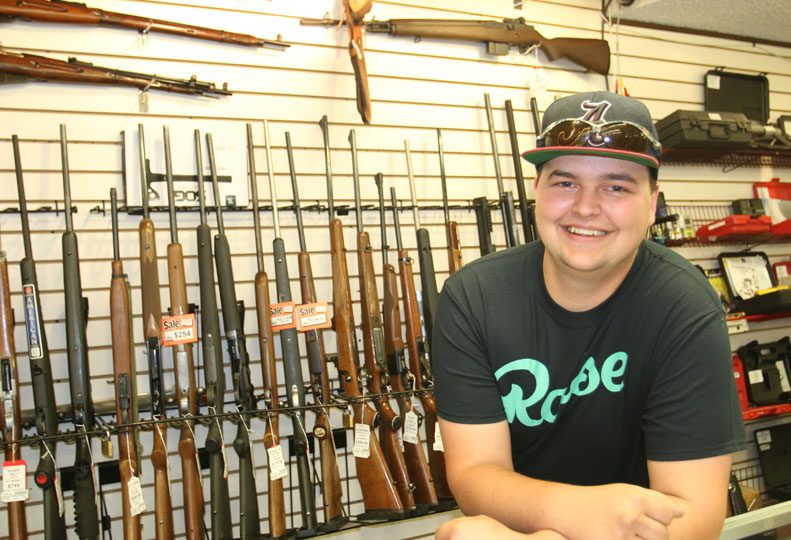
Home » Pawnbrokers see no letup in demand despite improved economy
Pawnbrokers see no letup in demand despite improved economy
Managers report default rate at 15 percent

July 16, 2015
Double Eagle Pawn district manager Brian Wegner believes he’s in an industry that is in demand regardless of the economic times around him.
Larry Carlson, the owner of Axel’s Pawnshop, agrees.
“People always need to borrow money, both in good times and bad times,” Carlson says.
And there’s more to the business than accessing cash.
“We’re a retail business not tremendously different from others,” asserts Carlson of his store at 3301 E. Sprague. “While retail sales tend to do better when the economy is tight, we do have shoppers who really enjoy shopping at pawn shops, Goodwill, and other second-hand merchandise stores. We opened 25 years ago, and what I learned is that you can’t paint pawn shops with a broad brush.”
Executives at Pawn 1 Inc., the Spokane-based company that used a corporate approach to open a chain of pawn stores over about the last 20 years, couldn’t be reached for comment for this story.
Both Carlson and Wegner say, though, that they didn’t experience a boom in business during the Great Recession of 2009 and the years following it. Their perspective is that the media may have distorted an image of cash-strapped Americans waiting in line to either sell or borrow against their possessions.
Conversely, they say their businesses aren’t experiencing a downturn as a result of reported economic improvement.
Late last month, the Washington state Employment Security Department reported a preliminary unemployment rate of 6.3 percent for May in Spokane County. That’s down from unemployment of 6.7 percent in the year-earlier month. A separate state report put total employment in the county at 214,070 in May, up from 208,790 in the year-earlier month.
Wegner and Carlson both report loan default rates of about 15 percent. “Most people have worked hard for their stuff and they want it back,” Wegner says.
Matt Schaaf is the owner of The Cash Connection Jewelry & Loan located at 8112 E. Sprague, in Spokane Valley. He says he doesn’t feel like there’s an economic recovery taking place based on the trend he’s seeing among customers.
“In the last five to six years, we’ve seen more selling than actual pawning,” Schaaf says. “And those that do pawn are more likely to default on their loans than they previously have. Times are still very tough for people.”
Wegner is the district manager of Double Eagle Pawn’s three locations. The company’s first store opened in Deer Park at 811 S. Main. The other two stores are at 3030 E. Sprague and 315 E. Francis in Spokane. He says each of three stores process on average 30 to 60 loans per day, with the overwhelming majority of those loans ranging from $50 to $300.
Wegner says the cost for a 90-day, $100 loan is $20. He says rates and fees are regulated by state law.
“Most people still think pawn means to sell,” Wegner says. “I would say that our average customer is in need of extra cash for projects around the home, auto repairs, or an immediate family emergency, and we’re a quick and reliable source that can help them achieve that without having to review their three-digit credit score.”
“What I love about this business is that you get the chance to actually help people,” Wegner says. “The other part is meeting the wide variety of people that come into the store. They’re from every age bracket and socio-economic background. There’s the consistent stereotype that it’s a back room, back alley industry. You know what? There are men and women who come into our stores to borrow against jewelry worth more than the average car.”
Wegner says in his 18 years in the industry he has frequently loaned to businesses to help secure payroll in the event they were unable to pay employees. He declines to identify the businesses. “Where they felt they were going to be denied by the bank—which probably would have happened—they came to us, and we were able to help them out. I can’t say I remember any of them ever defaulting on a loan.”
Carlson says his store caters more towards customers in search of tools. “I’d say 60 percent of our main inventory is tools,” he says. “We have a steady supply of tools through summer and winter so we try not to experience significant drop-offs in business during the course of the year.”
He adds, “Things that honestly affect traffic into the store are extremely localized. A storm water drain or road-paving project in front of your business will hurt more than anything.”
Latest News Banking & Finance Retail
Related Articles
Related Products




_web.jpg?1743064725)